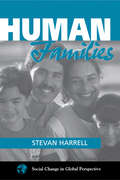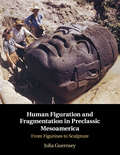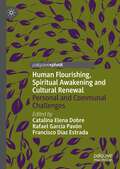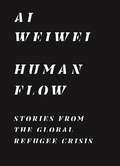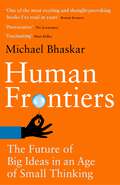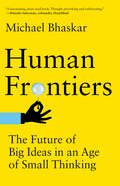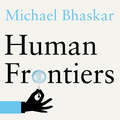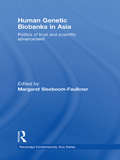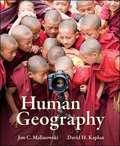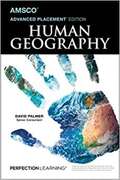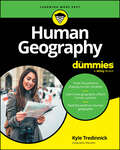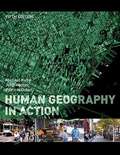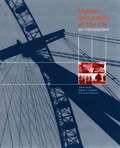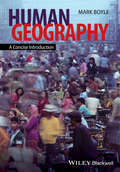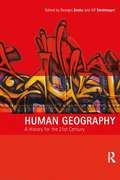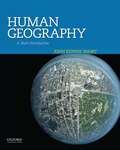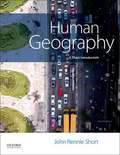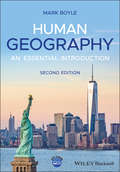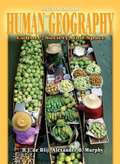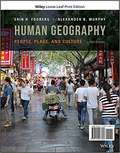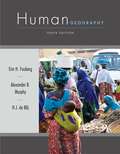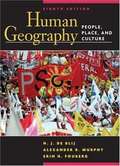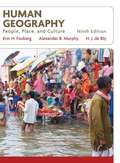- Table View
- List View
Human Families (Social Change In Global Perspective Ser.)
by Stevan HarrellThis detailed study maps variations in family systems throughout the world, focusing on the ways families cooperate and interact with their societies. Harrell describes families in nomadic bands, traditional African societies, Polynesian and Micronesian societies, native societies of the Pacific Northwest coast, preindustrial class societies, and modern industrial societies. His extensive case studies are clearly illustrated with unique diagrams that allow comparison of complex groups and family processes extending over a generation. }This detailed study maps the variations in family systems throughout the world, focusing on the ways families interact with their societies. Tracing the developmental cycle of families in a wide range of times and places, Stevan Harrell shows how family members in different societies must cooperate to perform various activities and thus organize themselves in particular ways. Within six major divisions, the book describes families in nomadic bands, traditional African societies, Polynesian and Micronesian societies, native societies of the Pacific Northwest coast, preindustrial class societies, and modern industrial societies. Within each group, the authors copious examples demonstrate the variation from one family system to another. His case studies are clearly illustrated with a unique set of diagrams that allow comparison of complex groups and of family processes extending over a generation. Scholars and advanced students alike will find this ambitious book an invaluable resource. }
Human Figuration and Fragmentation in Preclassic Mesoamerica: From Figurines to Sculpture
by Julia GuernseyIn this book, Julia Guernsey examines the relationship between human figuration, fragmentation, bodily divisibility, personhood, and community in ancient Mesoamerica. Contending that representation of the human body in the pre-classic period gradually became a privileged act, she argues that human figuration as well as the fragmentation of both human representations and human bodies reveals ancient conceptualizations of personhood and the relationship of individual to the community. Considering ceramic figurines and stone sculpture together with archaeological data, Guernsey weaves together evidence and ideas drawn from art history, archaeology, and anthropology to construct a rich, cultural history of Mesoamerican practices of figuration and fragmentation. A methodologically innovative study, her book has ramifications for scholars working in Mesoamerica and, more generally, those interested in the significance of human representation.
Human Flourishing, Spiritual Awakening and Cultural Renewal: Personal and Communal Challenges
by Francisco Díaz Estrada Catalina Elena Dobre Rafael García PavónThis book seeks to generate a theoretical and a reflective framework to re-connect people with culture and spirituality. It seeks to recreate important links between these domains to provide interpretative, foundational, and ethical perspectives. It is distinctive in that it focusses on the challenges that humanity is facing at a cultural, social, moral, and spiritual level. It provides a philosophical understanding of humanity from a humanistic and multidisciplinary perspective (encompassing ethics, language, art/cinema, political, cultural and gender approaches) and offers a variety of ways of how we can rethink our culture and our society for the future.
Human Flow: Stories from the Global Refugee Crisis
by Weiwei AiA powerful portrait of the greatest humanitarian emergency of our time, from the director of Human FlowIn the course of making Human Flow, his epic feature documentary about the global refugee crisis, the artist Ai Weiwei and his collaborators interviewed more than 600 refugees, aid workers, politicians, activists, doctors, and local authorities in twenty-three countries around the world. A handful of those interviews were included in the film. This book presents one hundred of these conversations in their entirety, providing compelling first-person stories of the lives of those affected by the crisis and those on the front lines of working to address its immense challenges.Speaking in their own words, refugees give voice to their experiences of migrating across borders, living in refugee camps, and struggling to rebuild their lives in unfamiliar and uncertain surroundings. They talk about the dire circumstances that drove them to migrate, whether war, famine, or persecution; and their hopes and fears for the future. A wide range of related voices provides context for the historical evolution of this crisis, the challenges for regions and states, and the options for moving forward.Complete with photographs taken by Ai Weiwei while filming Human Flow, this book provides a powerful, personal, and moving account of the most urgent humanitarian crisis of our time.
Human Frontiers: The Future of Big Ideas in an Age of Small Thinking
by Michael Bhaskar'A fascinating, must-read book covering a vast array of topics from the arts to the sciences, technology to policy. This is a brilliant and thought-provoking response to one of the most critical questions of our age: how we will come up with the next generation of innovation and truly fresh ideas?'Mustafa Suleyman, cofounder of DeepMind and Google VP'Have "big ideas" and big social and economic changes disappeared from the scene? Michael Bhaskar's Human Frontiers is the best look at these all-important questions.'Tyler Cowen, author of The Great Stagnation and The Complacent Class'Michael Bhaskar explores the disturbing possibility that a complacent, cautious civilization has lost ambition and is slowly sinking into technological stagnation rather than accelerating into a magical future. He is calling for bold, adventurous innovators to go big again. A fascinating book'Matt Ridley, author of How Innovation WorksWhere next for humanity? Is our future one of endless improvement in all areas of life, from technology and travel to medicine, movies and music? Or are our best years behind us? It's easy to assume that the story of modern society is one of consistent, radical progress, but this is no longer true: more academics are researching than ever before but their work leads to fewer breakthroughs; innovation is incremental, limited to the digital sphere; the much-vaunted cure for cancer remains elusive; space travel has stalled since the heady era of the moonshot; politics is stuck in a rut, and the creative industries seem trapped in an ongoing cycle of rehashing genres and classics. The most ambitious ideas now struggle. Our great-great-great grandparents saw a series of transformative ideas revolutionise almost everything in just a few decades. Today, in contrast, short termism, risk aversion, and fractious decision making leaves the landscape timid and unimaginative.In Human Frontiers, Michael Bhaskar draws a vividly entertaining and expansive portrait of humanity's relationship with big ideas. He argues that stasis at the frontier is the result of having already pushed so far, taken easy wins and started to hit limits. But new thinking is still possible. By adopting bold global approaches, deploying cutting edge technology like AI and embracing a culture of change, we can push through and expand afresh.Perfect for anyone who has wondered why we haven't gone further, this book shows in fascinating detail how the 21st century could stall - or be the most revolutionary time in human history.
Human Frontiers: The Future of Big Ideas in an Age of Small Thinking
by Michael BhaskarWhy has the flow of big, world-changing ideas slowed down? A provocative look at what happens next at the frontiers of human knowledge.The history of humanity is the history of big ideas that expand our frontiers—from the wheel to space flight, cave painting to the massively multiplayer game, monotheistic religion to quantum theory. And yet for the past few decades, apart from a rush of new gadgets and the explosion of digital technology, world-changing ideas have been harder to come by. Since the 1970s, big ideas have happened incrementally—recycled, focused in narrow bands of innovation. In this provocative book, Michael Bhaskar looks at why the flow of big, world-changing ideas has slowed, and what this means for the future.Bhaskar argues that the challenge at the frontiers of knowledge has arisen not because we are unimaginative and bad at realizing big ideas but because we have already pushed so far. If we compare the world of our great-great-great-grandparents to ours today, we can see how a series of transformative ideas revolutionized almost everything in just a century and a half. But recently, because of short-termism, risk aversion, and fractious decision making, we have built a cautious, unimaginative world. Bhaskar shows how we can start to expand the frontier again by thinking big—embarking on the next Universal Declaration of Human Rightsor Apollo mission—and embracing change.
Human Frontiers: The Future of Big Ideas in an Age of Small Thinking
by Michael Bhaskar'A fascinating book . . . Bhaskar is a reassuringly positive and often witty guide'Observer'A fascinating, must-read book covering a vast array of topics from the arts to the sciences, technology to policy. This is a brilliant and thought-provoking response to one of the most critical questions of our age: how we will come up with the next generation of innovation and truly fresh ideas?'Mustafa Suleyman, cofounder of DeepMind and Google VP'Have "big ideas" and big social and economic changes disappeared from the scene? Michael Bhaskar's Human Frontiers is the best look at these all-important questions.'Tyler Cowen, author of The Great Stagnation and The Complacent Class'Michael Bhaskar explores the disturbing possibility that a complacent, cautious civilization has lost ambition and is slowly sinking into technological stagnation rather than accelerating into a magical future. He is calling for bold, adventurous innovators to go big again. A fascinating book'Matt Ridley, author of How Innovation WorksWhere next for humanity? Is our future one of endless improvement in all areas of life, from technology and travel to medicine, movies and music? Or are our best years behind us? It's easy to assume that the story of modern society is one of consistent, radical progress, but this is no longer true: more academics are researching than ever before but their work leads to fewer breakthroughs; innovation is incremental, limited to the digital sphere; the much-vaunted cure for cancer remains elusive; space travel has stalled since the heady era of the moonshot; politics is stuck in a rut, and the creative industries seem trapped in an ongoing cycle of rehashing genres and classics. The most ambitious ideas now struggle. Our great-great-great grandparents saw a series of transformative ideas revolutionise almost everything in just a few decades. Today, in contrast, short termism, risk aversion, and fractious decision making leaves the landscape timid and unimaginative.In Human Frontiers, Michael Bhaskar draws a vividly entertaining and expansive portrait of humanity's relationship with big ideas. He argues that stasis at the frontier is the result of having already pushed so far, taken easy wins and started to hit limits. But new thinking is still possible. By adopting bold global approaches, deploying cutting edge technology like AI and embracing a culture of change, we can push through and expand afresh.Perfect for anyone who has wondered why we haven't gone further, this book shows in fascinating detail how the 21st century could stall - or be the most revolutionary time in human history.
Human Genetic Biobanks in Asia: Politics of trust and scientific advancement (Routledge Contemporary Asia Series)
by Margaret Sleeboom-FaulknerThis volume investigates human genetic biobanking and its regulation in various Asian countries and areas, including Japan, Mainland China, Taiwan, Hong Kong, India and Indonesia.. It sheds light on how cultural, socio-political and economic factors influence the set-up of bioethical regulation for human genetic biobanks and how bioethical sensitivities surrounding biobanks are handled. Apart from placing discourses of trust in an international perspective, the comparative materials presented in this volume also put into perspective the concepts of genetic theft and exploitation, and genetic wealth and trust. This collection contains case studies of biobanking practices in societies with different needs and welfare levels, and provides insights into government strategies towards genetic resources by examining bioethics as practised at home.
Human Geography
by David Kaplan Jon Malinowski David H. KaplanGeographers believe that phenomena on the earth’s surface are not random, but rather the result of a complex series of processes going on at the local, regional, national and international scale. Human Geography, 1e by Jon Malinowksi and David Kaplan, will introduce you to how geographers attempt to make sense of the diverse reality of human populations on the Earth’s surface. Human Geography, 1e uses a modular approach. Each of the 18 chapters are divided into page “spreads” to easily allow an instructor the flexibility to customize his or her course.
Human Geography
by David L. PalmerConcise and accessible text structured and written to follow the current AP Course and Exam Description. Examine how human behavior transforms the earth's surface in response to changing social, cultural, and political needs in short, focused sections. <P><P>The text covers all topic areas for the AP Human Geography course and examines current events and key theoretical areas such as environmental determinism and psychogeography.
Human Geography For Dummies
by Kyle TredinnickYour map to understanding human geography Human Geography For Dummies introduces you to the ideas and perspectives encompassed by the field of human geography, and makes a great supplement to human geography courses in high school or college. So what is human geography? It’s not about drawing maps all over your body (although you’re welcome to do that if you want—no judgment). Human geography explores the relationship between humans and their natural environment, tracking the broad social patterns that shape human societies. Inside, you’ll learn about immigration, urbanization, globalization, empire and political expansion, and economic systems, to name a few. This learner-friendly Dummies guide explains all the key concepts clearly and succinctly. Find out how location and geography impact population, culture, economics, and politics Learn about contemporary issues in human migration, health, and global peace and stability Get a clear understanding of all the key concepts covered in your introductory human geography class Understand how society got to where it is, and get a glimpse into potential changes in the futureHuman Geography For Dummies is perfect for students who need additional study materials or simplified explanations. It’s also a fun read for anyone curious about the comings and goings of people on this planet of ours.
Human Geography in Action
by Michael Kuby Patricia Gober John HarnerThe new fifth edition enhances coverage in the field by enabling economists and political geographers to work online with GIS maps, spreadsheets, simulations, and animated graphs. The book has been updated to use maps of traditional foods and vernacular phrases for soft drinks to illustrate culture regions. Expanded discussions of migration include a look at international immigration. New material is also presented on the local food movement and the breakdown in negotiations for agricultural trade agreements at the Doha trade summit. In addition, economists and political geographers will find key terms throughout the chapters such as creative class, outsourcing, substitution of capital for labor, and transit-oriented development.
Human Geography of the UK: An Introduction
by Eleonore Kofman Irene Hardill David GrahamThis new key textbook for introductory courses in human geography provides first and second-year undergraduates with a comprehensive thematic approach to the changing human geography of the UK at the end of the twentieth and beginning of the twenty-first century. Covering local, regional, national, European and global issues, it also explores in some detail topics which are part of the lived experience of undergraduates themselves, such as crime, unemployment, social exclusion and AIDS.User-friendly textbook features include:* chapter introductions, summaries and important theoretical principles* up-to-date further reading and key on-line sources* case studies, examples and revision questions.
Human Geography: A Concise Introduction (Short Introductions To Geography Ser.)
by Mark BoyleUsing the story of the “West and the world” as its backdrop, this book provides for beginning students a clear and concise introduction to Human Geography, including its key concepts, seminal thinkers and their theories, contemporary debates, and celebrated case studies. Introduces and applies the basic concepts of human geography in clear, concise, and engaging prose Explores the significance of the rise, reign, and faltering of the West from around the fifteenth century in the shaping of the key demographic, environmental, social, economic, political, and cultural processes active in the world today Addresses important thinkers, debates, and theories in an accessible manner with a focus on discerning the inherent Western bias in human geographical ideas Incorporates case studies that explore human geographies which are being made in both Western and non Western regions, including Latin America, Africa and Asia. Is written so as to be accessible to students and contains chapter learning objectives, checklists of key ideas, chapter essay questions, zoom in boxes, guidance for further reading and a book glossary. Accompanied by a website at www.wiley.com/go/boyle featuring, for students, tutorial exercises, bonus zoom in boxes, links to further learning resources and biographies of key thinkers, and for instructors, further essay questions, multiple choice exam questions, and ppt lecture slides for each chapter.
Human Geography: A History for the Twenty-First Century (Human Geography in the Making)
by Ulf Strohmayer Georges Benko'Human Geography' examines the major trends, debates, research and conceptual evolution of human geography during the twentieth century. Considering each of the subject's primary subfields in turn, it addresses developments in both continental European and Anglo-American geography, providing a cutting-edge evaluation of each.Written clearly and accessibly by leading researchers, the book combines historical astuteness with personal insights and draws on a range of theoretical positions. A central theme of the book is the relative decline of the traditional subdisciplines towards the end of the twentieth century, and the continuing movement towards interdisciplinarity in which the various strands of human geography are seen as inextricably linked.This stimulating and exciting new book provides a unique insight into the study of geography during the twentieth century, and is essential reading for anyone studying the history and philosophy of the subject.
Human Geography: A Short Introduction
by John Rennie ShortHuman Geography: A Short Introduction gives students a sense of the complex human geography of the contemporary world with a concise, focused format in an accessible, engaging style. The book is a foundation for college courses in human geography. Using detailed case studies to enliven broader arguments and comprehensive scholarship, Human Geography is the ideal choice for instructors who want the flexibility of a short primer without compromising on scholarly excellence. It is specifically designed to be augmented by the instructors. It provides a fresh update to Human Geography in a new and exciting manner. Features* Detailed and engaging case studies bring the book's broader arguments to life* Every chapter includes a list of further readings and websites for instructors and students* Priced at less than one third the cost of the best-selling books in the field, yet supported by strong graphics and supplements programs, this book represents unparalleled flexibility and value for both students and professors.
Human Geography: A Short Introduction
by John ShortThe book provides all the basics that students need while simultaneously empowering professors to customize their courses. Priced at less than one-third the cost of comparable books in the field, and supported by strong graphics and a robust support package, Human Geography.
Human Geography: A Spatial Perspective
by Sarah Bednarz Mark Bockenhauer Fred HiebertNIMAC-sourced textbook
Human Geography: An Essential Introduction (Short Introductions To Geography Ser.)
by Mark BoyleRevised, Extended, and Extensively Updated Text Uses Historical Geographical and Thematic Approach to Provide Undergraduates with a Firm Foundation in Human Geography Drawing on nearly three decades of instructional experience and a wealth of testing pedagogical innovations with students, Mark Boyle has revised and expanded this authoritative and comprehensive introduction to Human Geography. As with the First Edition, Boyle follows the premise that “history makes geography whilst geography makes history,” and that the key to studying the principal demographic, social, political, economic, cultural and environmental processes in any region in the world today is to look at how that region has been impacted by, and in turn has impacted, the story of the rise, reign, and decline of the West. Moreover he argues that Human Geography itself is best understood as both an intellectual endeavour and a historical, political, and institutional project. Informed by recent developments in post-colonial scholarship, the book covers key concepts, seminal thinkers, and influential texts in the field. Although designed for the beginner student, Boyle does not shy away from ideas and debates often avoided in introductory texts, clearly communicating theory without condescension. In addition, he places human geography in its larger academic context, discussing the influences on the field from related subjects. Notable features in the Second Edition include: Extensive revision and updating of coverage of key ideas, developments, debates and case studies New chapter on uneven geographical development at different scales and development theory and practice Dedicated coverage of Covid-19s geographies New learning resources (figures, tables, plates, maps, Deep Dive boxes, etc.) throughout the text, plus learning objectives, essay questions, checklists summarizing key ideas, and guidance for further reading Updated and expanded companion website with MP4 and MP3 chapter-by-chapter lectures and PowerPoint slides for each chapter, new multiple-choice exam paper and additional essay-style exam questions, and a wide range of student tutorial exercises Human Geography: An Essential Introduction, Second Edition is an excellent foundational text for undergraduate courses in human geography, globalization, Western civilization, historiographies of intellectual thought, the grand public problems confronting humanity in the twenty first century, and other wider social science courses.
Human Geography: Culture, Society, and Space
by H. J. de Blij Alexander B. MurphyAuthoritatively written by a geographer who has worked on every continent, Human Geography is sensitive to people of other cultures and from all walks of life. * Focuses on key geographic concepts and puts them in practical and current perspective. *
Human Geography: Landscapes of Human Activity
by Jerome D. Fellmann Arthur GetisTo introduce its users to the scope and excitement of geography and its relevance to their daily lives and roles as informed citizens.
Human Geography: People, Place, and Culture
by H. J. de Blij Erin H. Fouberg Alexander B. MurphyFouberg/Murphy: Human Geography: People, Places, and Culture 12th edition teaches students to appreciate the diversity of people, places, and cultures, and understand the role people play in shaping our world. The goals of this edition are to provide geographic context to global, regional, national and local issues and to teach students to think geographically and critically about these issues. Human Geography features beautifully designed maps, dozens of vibrant photographs taken by the author team, and author and guest field notes that help students see how geographers read cultural landscapes and use fieldwork to understand places. <p><p> Fouberg’s Human Geography, 12th Edition now integrates Threshold Concepts to help students develop their ability to think geographically. Once they learn and apply one of these concepts in the context of a given place, students integrate it into their thinking and can draw from it as they learn new material and explore other places.
Human Geography: People, Place, and Culture (10th edition)
by H. J. de Blij Erin H. Fouberg Alexander B. MurphyHuman Geography 10th Edition includes all of the important concepts and theory on Human Geography as previous issues with a more succinct and engaging narrative while going in depth to touch on all the major themes of the topic. The text focuses on identity and how every human being forges an identity in a globalized world. It includes recurring coverage of "identity" and how people make places and shape identities to see global, local and individual implications of decisions that people make every day. The main objective of this issue is to provide more understanding of human systems from a spatial perspective; ways to think globally; and ways to understand real-world implications of Human Geography. The text will help encourage a better understanding of how to create an identity in a globalized world and how decisions happen in a global context and can have global impacts.
Human Geography: People, Place, and Culture (8th edition)
by Harm J. de Blij Erin H. Fouberg Alexander B. MurphyHuman Geography: Culture, Society and Space challenges students to think geographically across scale and across a wide range of geographical phenomena and global issues. The authors engage the students throughout the text by posing geographical questions that encourage students to think critically about their own locality, region, nation, and world. In the Eighth Edition, the authors reformat the text to 14 chapters, provide a clear outline of key questions for each chapter, integrate their own field experiences, and rewrite the text to guide students through answers to geographic questions. The Eighth Edition includes three new chapters: 'Identity: Race, Ethnicity and Gender,' 'Local Culture, Popular Culture, and Cultural Landscapes,' and 'Geographic Networks. ' The concepts of globalization, identity, development, sense of place, and construction of scale are infused throughout the text. The author team draws from studies in geography and across disciplines to bring a broad and up-to-date perspective on the kinds of research geographers have done and are currently doing on a wide range of human geography topics. In the Eighth Edition, de Blij and Murphy welcome new coauthor Erin Hogan Fouberg (South Dakota State University), who brings her expertise in geography education and political geography. The author team created a new pedagogy and writing style for the Eighth Edition that make the book more accessible to students and faculty.
Human Geography: People, Place, and Culture (9th edition)
by Harm J. de Blij Erin H. Fouberg Alexander B. MurphyHuman Geography gets general readers to think geographically across scale and across a wide range of geographical phenomena and global issues. All concepts and themes are touched on with the historical background one would expect, but also with current examples to make the reading more relevant. The content is written in such a way that it is approachable and appealing. It includes all of the important themes in a succinct and engaging narrative style that can easily be understood. From the Field boxes and opening vignettes help anyone who has not personally traveled much of the world. General readers will also find the latest data as they build their understanding of important concepts.
